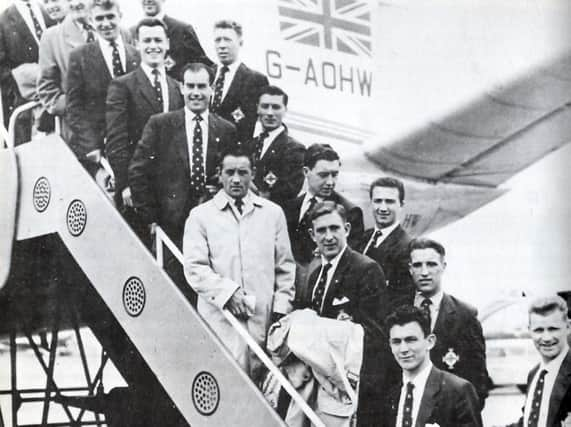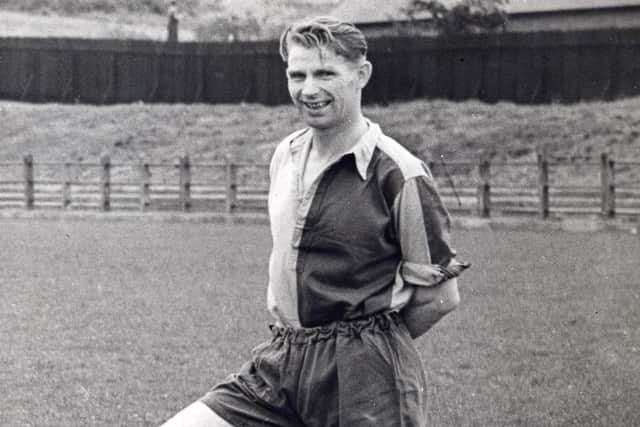How Messi and Suarez have Peter Doherty to thank for spot kick routine


Whilst 100 per cent legal, it is not something that you see practiced a lot, and has thrown up suggestions of being unsporting.
There have been a few famous instances of the two player spot kick down the years. In a Dutch league match in December 1982, Ajax were leading 1-0 when Cruyff, by then a 35-year-old veteran, won a penalty.
Advertisement
Hide AdAdvertisement
Hide AdCruyff passed the spot-kick to his left where Danish winger Olsen came racing in and returned the ball for Cruyff to tap in.


The perplexed Helmond Sport goalkeeper was left standing with his hands on his hips as the Ajax players celebrated.
And in 2016 Lionel Messi passed his penalty to give Luis Suarez his hat-trick in Barcelona’s 6-1 win over Celta Vigo in La Liga.
But it doesn’t always go to plan as Robert Pires and Thierry Henry proved when Arsenal took on Manchester City back in 2005.
Advertisement
Hide AdAdvertisement
Hide AdThe talented duo made a laughing stock of themselves when their attempted ‘two-touch’ penalty in the game at Highbury went badly wrong.
Pires tried to roll the ball to his left with the intention that Henry, steaming into the box, would score.
However, Pires barely made contact with the ball and two City defenders came in to clear.
But where did the two-touch penalty originate?
One of the earliest recorded two-touch penalties came from 1957 when prolific Belgian striker Rik Coppens passed a spot-kick to team-mate Andre Piters, who gave it back to Coppens, and he slotted past the bemused Iceland goalkeeper in a World Cup qualifier.
Belgium went on to win the game 8-3.
Advertisement
Hide AdAdvertisement
Hide AdMany point to be the inventor of this variation of the spot kick, but the real inventor came from a little closer to home.
On May 1 1957 Danny Blanchflower and Jimmy McIroy combined to score a penalty for Northern Ireland in the 3-0 World Cup qualifier victory over Portugal at Windsor Park.
That was a glorious era for the Green and White Army who sealed progression to their first ever World Cup finals in Sweden. The team was packed with legendary figures who proved their quality before eventually falling at the quarter-finals.
The iconic Peter Doherty led the Northern Ireland side in Sweden, and film producer Evan Marshall believes the spot kick trick all stems from the former Manchester City star.
Advertisement
Hide AdAdvertisement
Hide AdWhilst putting together his Spirit Of ’58 documentary on Northern Ireland’s qualification for that World Cup, he stumbled across where the story of the two-man penalty began.
“He (Doherty) was manager of Northern Ireland in 1957 when Danny Blanchflower and Jimmy McIroy did it and it was captured on film by the newsreels,” said Evan.
“Before he became manager Peter was one of the most famous players in the United Kingdom, it’s reckoned he was second only to George Best.
“Sadly not very much footage survives of him as a player, his best years were taken up by the war.
Advertisement
Hide AdAdvertisement
Hide Ad“Peter played after the war at Derby County and they got to the very first FA cup final that was played after the war which was a very, very big occasion and they won.
“One of the other players on the team was Raich Carter and apparently, Doherty and Carter tried this penalty.
“Trying to pin down online a source is very, very difficult.
“It may have been when they were playing for Derby County or it could have been in one of the exhibition matches played around then but it seems that these two players were the first to try it and then Danny Blanchflower and Jimmy McIlroy were the first players to have it captured on film.”
Advertisement
Hide AdAdvertisement
Hide AdSo what did the players make of Blanchflower and McIlroy’s effort back in ‘57?
“The referee didn’t know what to do, the crowd didn’t know what had happened, it had never been seen before,” said the late Harry Gregg in the Spirit of ‘58 documentary.
“If it didn’t go in what would we have said,” added Billy Bingham.
Thankfully it did and it created a famous dynasty in Northern Ireland football as Our Wee Country went on to announce itself on the world stage.
Advertisement
Hide AdAdvertisement
Hide Ad---------------------------------------------------------------------------------
A message from the Editor:
Thank you for reading this story on our website. While I have your attention, I also have an important request to make of you.
With the coronavirus lockdown having a major impact on many of our advertisers - and consequently the revenue we receive - we are more reliant than ever on you taking out a digital subscription.
Subscribe to newsletter.co.uk and enjoy unlimited access to the best Northern Irish and UK news and information online and on our app. With a digital subscription, you can read more than five articles, see fewer ads, enjoy faster load times, and get access to exclusive newsletters and content. Visit https://www.newsletter.co.uk/subscriptions now to sign up.
Advertisement
Hide AdAdvertisement
Hide AdOur journalism costs money and we rely on advertising, print and digital revenues to help to support them. By supporting us, we are able to support you in providing trusted, fact-checked content for this website.
Thank you,
Alistair Bushe
Editor
Comment Guidelines
National World encourages reader discussion on our stories. User feedback, insights and back-and-forth exchanges add a rich layer of context to reporting. Please review our Community Guidelines before commenting.